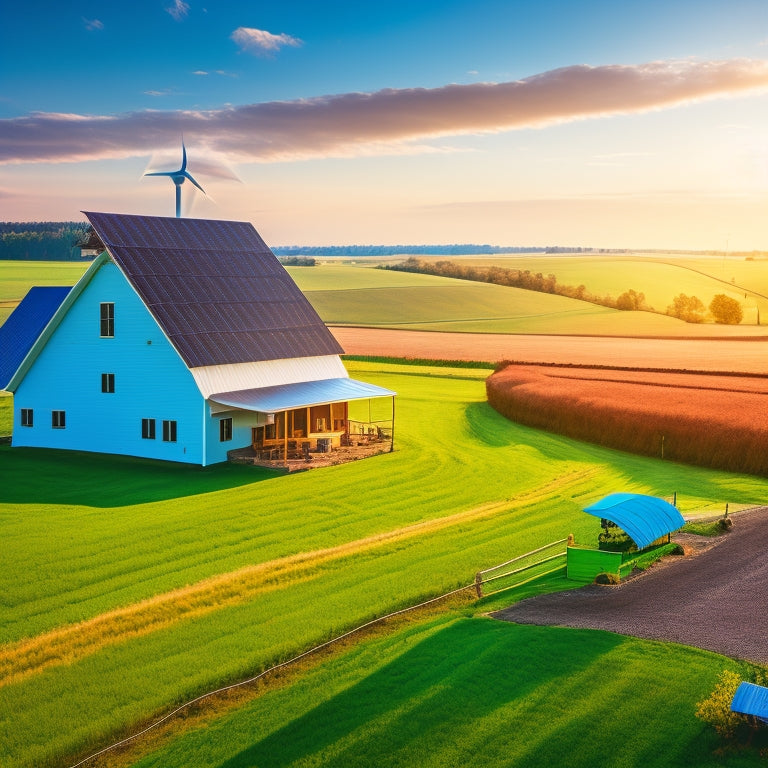
5 Ways to Energize Rural Farms With Renewable Energy
Share
You're now starting your rural farm with renewable energy, cutting reliance on traditional grids and mitigating the uncertainty of fluctuating electricity prices. Five ways to energize your farm include harnessing solar power remotely, gaining energy independence, and using renewable energy for irrigation. You can also power farm equipment efficiently and adopt grid-free farming practices. By switching to renewable energy, you'll enhance farmstead resilience, reduce your carbon footprint, and contribute to a cleaner, more sustainable food system. As you begin on this sustainable journey, you'll discover even more innovative ways to energize your rural farm.
Key Takeaways
• Harness solar power for essential farm operations, providing energy independence and reducing reliance on external power providers.
• Implement renewable energy for irrigation systems, optimizing water conservation efforts and enhancing crop monitoring capabilities.
• Switch to electric or hybrid farm equipment, reducing fuel costs and emissions while integrating fuel cells for clean power.
• Generate power independently with modular and scalable remote solar power systems, enhancing farmstead resilience and rural autonomy.
• Explore farm loans and community outreach programs to support renewable energy projects, contributing to a cleaner and more sustainable food system.
Harnessing Solar Power Remotely
Regularly, rural farms are leveraging solar power to energize their operations, and you can too by harnessing solar energy remotely. One of the significant advantages of remote solar power is that it enables farms to access energy even in areas with limited grid connectivity. This is particularly vital for rural farms, where off-grid communication and rural connectivity can be a significant challenge.
By harnessing solar energy remotely, you can power essential farm operations, such as irrigation systems, lighting, and communication devices.
Moreover, remote solar power systems can be designed to be modular and scalable, allowing you to expand or modify your energy infrastructure as your farm's needs evolve. This flexibility is especially important for rural farms, where energy demands can fluctuate depending on the season or crop cycles.
Energy Independence for Farmers
By achieving energy independence, you can break free from reliance on external power providers and take control of your farm's energy needs, reducing your exposure to fluctuating electricity prices and enhancing your overall operational resilience. This means you'll no longer be at the mercy of unpredictable energy costs, allowing you to better plan and manage your farm's finances.
To achieve energy independence, you can explore farm loans specifically designed to support renewable energy projects. These loans can help you cover the upfront costs of installing solar panels or wind turbines, for example. Additionally, community outreach programs can provide valuable resources and guidance to help you navigate the process of shifting to renewable energy.
Renewable Energy for Irrigation
As you work towards energy independence, you're likely to find that irrigation systems are a significant contributor to your farm's energy consumption, and that's where renewable energy can make a significant impact, powering your pumps and reducing your reliance on diesel or grid electricity.
Renewable energy can be integrated into your irrigation system through solar-powered or wind-powered pumps, reducing your energy costs and carbon footprint. By leveraging renewable energy, you can optimize your water conservation efforts, ensuring that every drop of water is used efficiently. This not only benefits your farm but also contributes to a more sustainable future.
Moreover, incorporating renewable energy into your irrigation system can enhance crop monitoring capabilities. With advanced sensors and monitoring systems, you can track soil moisture levels, temperature, and humidity, enabling data-driven decisions to optimize crop yields and reduce water waste.
Powering Farm Equipment Efficiently
Furthermore, considerably diesel-powered farm equipment consuming a large amount of energy, you can greatly reduce fuel costs and emissions by switching to electric or hybrid alternatives powered by renewable energy sources.
Electric tractors, for instance, can be charged using solar or wind power, greatly decreasing your carbon footprint.
In addition, fuel cells can be integrated into farm equipment, providing a clean and efficient source of power.
These innovative solutions not only reduce your environmental impact but also lead to substantial cost savings in the long run.
Grid-Free Farming With Renewables
You can shift away from reliance on the grid by integrating renewable energy systems into your farm's infrastructure, allowing you to generate power independently and sustainably. This move towards grid-free farming with renewables enhances farmstead resilience, ensuring that your operation remains productive even during grid outages or natural disasters.
By harnessing the power of solar, wind, or biogas, you can reduce your reliance on external energy sources and enjoy rural autonomy.
With on-site renewable energy, you'll have more control over your energy costs and can allocate resources more efficiently. For instance, you can use solar power to pump water for irrigation or power your farm equipment.
By reducing your reliance on the grid, you'll also decrease your carbon footprint, contributing to a more sustainable agricultural practice. As you evolve to grid-free farming, you'll not only improve your farm's resilience but also contribute to a cleaner, more sustainable food system.
Frequently Asked Questions
Can Renewable Energy Systems Be Designed for Small-Scale Farms?
You can design renewable energy systems for small-scale farms by first conducting an energy audit to determine the farm's load requirements, then selecting suitable technologies to meet that load, ensuring a sustainable and efficient energy supply.
How Do I Choose the Right Renewable Energy Consultant for My Farm?
When choosing a renewable energy consultant for your farm, you'll want to align their expertise with your farm goals, ensuring they conduct a thorough energy audit to identify the best solutions tailored to your unique operation.
Are There Government Incentives for Rural Renewable Energy Projects?
You can tap into various government incentives for rural renewable energy projects, including Rural Subsidies, Energy Grants, Federal Policies, State Initiatives, Tax Credits, and Renewable Loans, to offset costs and boost your farm's sustainability.
Can I Use Renewable Energy to Power My Farm's Water Treatment Systems?
You can harness renewable energy to power your farm's water treatment systems, achieving energy independence and sustainable water purification, while reducing your carbon footprint and reliance on non-renewable energy sources.
How Does Renewable Energy Impact the Overall Value of My Farm?
As you incorporate renewable energy, your farm's appraisal value increases, potentially reducing property taxes; a win-win for your bottom line, as sustainable practices boost your farm's overall value and appeal.
Related Posts
-

Solid State Batteries in Electric Vehicles
Solid-state batteries revolutionize electric vehicles by offering a longer lifespan and higher energy density than tr...
-

Top-Rated Home Solar Power Kits for Achieving Energy Independence
Top-rated home solar power kits enable you to achieve energy independence by greatly cutting your energy costs. You c...
-

Smart Grid Technology Implementation Challenges
You'll encounter several challenges when implementing smart grid technology, particularly in cost management, scalabi...


